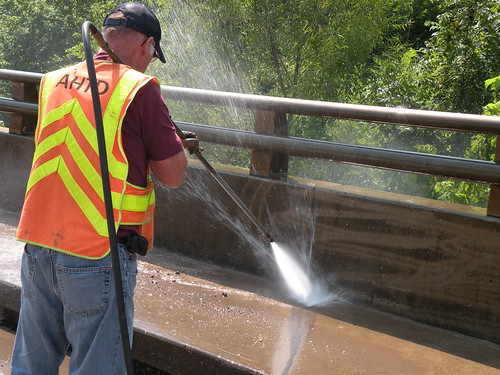Watershed Assessment and Planning Applications”
November 17 - 19, 2009, Fayetteville, Arkansas
Nonpoint source (NPS) pollution is the Nation's largest source of water quality problems with sediment being one of the most common pollutants, contributing to the impairment of many of our lakes and streams. Understanding erosion processes and sources of sediment associated with land-use practices is an important component of watershed assessment and aids in evaluating management practices to reduce sediment. The Water Erosion Prediction Project or WEPP model is a tool that can be used to predict soil erosion and sediment delivery to provide science-based information for watershed planning.

The WEPP hydrology and erosion model mathematically describes soil erosion and sediment delivery processes. For a single run, WEPP uses several decades of stochastically-generated daily weather to predict daily plant growth and decay, residue accumulation and decay and the soil water balance. For each day with precipitation WEPP predicts infiltration and runoff; and sediment detachment, transport, deposition and delivery along a hill slope and through a stream system. The WEPP model distributes soil loss spatially (at a given point on the hill or in the stream network) and temporally (on a daily, monthly, or annual basis).
Upon completing this course: 1) participants will have a better understanding of erosion processes; 2) they will be able to predict erosion from roads and disturbed hill slopes using online interfaces; 3) they will know how to modify files in WEPP Windows to analyze forests and farmland hillsides and to support GeoWEPP watershed analyses; 4) they will have completed two sets of GeoWEPP exercises, one for identifying critical areas of erosion within a watershed following a wildfire and one for setting up GeoWEPP to complete a Cumulative Watershed Effects analysis including forest and farmlands; and 5) they will gain experience in collecting road and hill slope data in the field and use it to run the WEPP model. A detailed course agenda is attached.
Key topics that will be covered include:
· Overview of science in the WEPP hydrology and erosion model using local climate, soil and topographic details.
· WEPP on-line training with web-based interfaces for forest and farm applications
o Best Management Practices for reducing sediment loss from roads
o Evaluating disturbed sites in forest, farm and urban areas
o Data collection in the field for roads and hillside sites
· Fundamental features of the WEPP Windows and GeoWEPP GIS interfaces as applied to disturbed hillsides and Cumulative Watershed Effects analyses
· Watershed management applications and hands-on sessions
· Case studies in which the WEPP is used to model sediment from forests and farm lands at a watershed scale and as a watershed management tool.
· Opportunities to network with other area watershed-management specialist.
Who should attend this training: This workshop is designed for professionals who work in the areas of natural resource management, water-quality protection, watershed management, and/or nonpoint source pollution. Specialists who will benefit from this training are likely to be employees of federal, state, county, and local agencies, watershed practitioners, scientists, engineers and consultants.

You do not have to be a modeler to attend this training. The current WEPP model is easy to learn and is user friendly. The principles and practices presented through this workshop are beneficial to professionals at all levels including managers.

Training approach, instructor, and presenters: The workshop will be taught through interactive lectures, hands-on modeling sessions, and case studies. The workshop will use data collected during a field session to make the WEPP model runs.
Dr. William John Elliot, P.E. is the main instructor for the training. He is a leading international expert on the WEPP model and its applications. Dr. Elliot assisted with the development of the WEPP model and has spent more than 20 years expanding and improving its capabilities. He has over 40 years experience in the area of soil erosion - process and prediction and has taught WEPP workshops throughout the United States, Uganda, and Brazil. Dr. Elliot is currently a research engineer for the Air Water and Aquatic Environments Science Program, USDA Forest Service, Rocky Mountain Research Station in Moscow, Idaho.
Other experts will share their experience in utilizing the WEPP model for watershed assessment and planning. Course presenters include: Ethan Inlander, The Nature Conservancy; Alan Clingenpeel, USDA, Forest Service, Ouachita National Forest; and Matthew Van Eps, P.E. & Sandi J. Formica, Watershed Conservation Resource Center.
Host and partners: The Mid-South Watershed Training Program was developed by the Watershed Conservation Resource Center (WCRC) through a US Environmental Protection Agency (US EPA) grant to provide watershed management training and technical tools needed by environmental professionals, watershed coordinators, conservation districts, and other watershed stakeholders to conserve, restore, and protect our natural resources. Through this program, the WCRC has partnered with the US EPA, USDA Forest Service and The Nature Conservancy to design, organize, and conduct the workshop.
Agenda and Travel Information: The course schedule, content, and speakers can be found in the agenda. Also detailed travel information including location, lodging directions, and parking can be found at the WCRC website, watershedconservation.org.
Registration: Space is limited, so please register early. To register, complete the attached registration form. If you have questions concerning registration, please contact Lori Linn at llinn@watershedconservation.org or at (479) 444-1916. The course tuition is $550 and includes course materials, three continental breakfasts, two lunches, one dinner, and break refreshments.





No comments:
Post a Comment